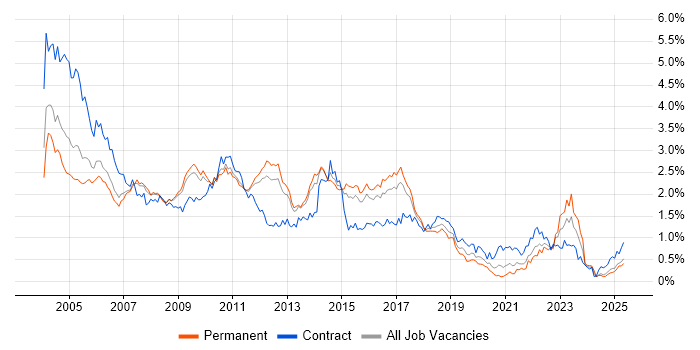PL/SQL (PLSQL)
England > East of England
The table below provides summary statistics for permanent job vacancies advertised in the East of England requiring PL/SQL skills. It includes a benchmarking guide to the annual salaries offered in vacancies that cited PL/SQL over the 6 months leading up to 14 June 2025, comparing them to the same period in the previous two years.
| 6 months to 14 Jun 2025 |
Same period 2024 | Same period 2023 | |
|---|---|---|---|
| Rank | 165 | 220 | 143 |
| Rank change year-on-year | +55 | -77 | +103 |
| Permanent jobs citing PL/SQL | 14 | 5 | 73 |
| As % of all permanent jobs advertised in the East of England | 0.41% | 0.073% | 1.57% |
| As % of the Programming Languages category | 1.48% | 0.27% | 4.52% |
| Number of salaries quoted | 14 | 2 | 20 |
| 10th Percentile | - | - | £50,375 |
| 25th Percentile | £29,250 | £41,250 | £51,250 |
| Median annual salary (50th Percentile) | £52,500 | £42,500 | £55,000 |
| Median % change year-on-year | +23.53% | -22.73% | +15.79% |
| 75th Percentile | £63,750 | £43,750 | £57,500 |
| 90th Percentile | £79,000 | - | £58,500 |
| England median annual salary | £65,000 | £60,000 | £55,390 |
| % change year-on-year | +8.33% | +8.32% | +5.50% |
All Programming Languages
East of England
PL/SQL falls under the Programming Languages category. For comparison with the information above, the following table provides summary statistics for all permanent job vacancies requiring coding skills in the East of England.
| Permanent vacancies with a requirement for coding skills | 949 | 1,830 | 1,615 |
| As % of all permanent jobs advertised in the East of England | 27.90% | 26.63% | 34.75% |
| Number of salaries quoted | 691 | 1,491 | 848 |
| 10th Percentile | £31,250 | £32,000 | £36,250 |
| 25th Percentile | £42,000 | £41,250 | £43,750 |
| Median annual salary (50th Percentile) | £55,000 | £55,000 | £57,500 |
| Median % change year-on-year | - | -4.35% | +9.52% |
| 75th Percentile | £66,230 | £68,750 | £71,250 |
| 90th Percentile | £77,500 | £80,000 | £80,000 |
| England median annual salary | £62,000 | £60,000 | £65,000 |
| % change year-on-year | +3.33% | -7.69% | +4.00% |
PL/SQL
Job Vacancy Trend in the East of England
Job postings citing PL/SQL as a proportion of all IT jobs advertised in the East of England.

PL/SQL
Salary Trend in the East of England
3-month moving average salary quoted in jobs citing PL/SQL in the East of England.
PL/SQL
Salary Histogram in the East of England
Salary distribution for jobs citing PL/SQL in the East of England over the 6 months to 14 June 2025.
PL/SQL
Job Locations in the East of England
The table below looks at the demand and provides a guide to the median salaries quoted in IT jobs citing PL/SQL within the East of England region over the 6 months to 14 June 2025. The 'Rank Change' column provides an indication of the change in demand within each location based on the same 6 month period last year.
| Location | Rank Change on Same Period Last Year |
Matching Permanent IT Job Ads |
Median Salary Past 6 Months |
Median Salary % Change on Same Period Last Year |
Live Jobs |
|---|---|---|---|---|---|
| Norfolk | - | 5 | £30,500 | - | |
| Cambridgeshire | +45 | 4 | £55,000 | - | 3 |
| Essex | - | 3 | £76,000 | - | 3 |
| Hertfordshire | +36 | 2 | £70,000 | +64.71% | |
| PL/SQL England |
|||||
PL/SQL
Co-occurring Skills and Capabilities in the East of England by Category
The follow tables expand on the table above by listing co-occurrences grouped by category. The same employment type, locality and period is covered with up to 20 co-occurrences shown in each of the following categories:
